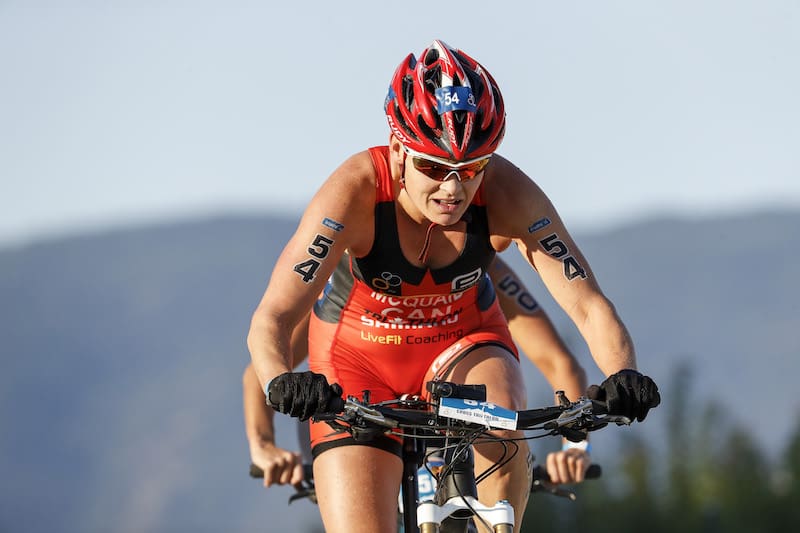How to stay motivated as our race season disappears
Keep your training mojo going through task-oriented training.
 Photo by:
Getty Images
Photo by:
Getty Images
Reset your normal training routine to maintain your fitness and motivation this summer, says five-time world champion Melanie McQuaid.
2020 has brought with it the most widespread disruption of modern life most of us have ever seen. Even Olympians are facing postponement of an event they have spent a quadrennial training for. In the face of this disappointment, there truly is only one response that is constructive. While you need to allow yourself to feel disappointed, angry, and sad all at once for the loss of racing opportunity, you then need to carry on training in whatever capacity you are able. That’s because, ultimately, the process of training is what’s valuable, regardless of what your race outcome might be.
I think those that were planning to do an Ironman to “check the box” will experience a reckoning with their motivation. This is the year to become a task-oriented athlete. Learning, and honing, your “process,” as all high-performing athletes do, is key in staying on track in the face of challenges. The goal is mastery versus dominance, and this perspective profoundly changes how you view yourself and the sport. The process of self-improvement is a powerful motivator, bringing out the best in those who find it.
Training for triathlon offers structure, social connection and a pathway to self improvement. Even a short disruption in our daily routine illustrates how much joy we all receive from “the grind.” Races are a celebration of the work that was accomplished, but they are not the high value item in the overall triathlon experience. Without races there is still immense value in the everyday process of striving for improvement.
The secret of mastery is maintaining motivation. Motivation is generally highest when there is belief that the goal is possible. Building this confidence that you see yourself achieving a goal might start with inspiration from another you can relate to. Reach out and find your support group and inspiration. Ask your friends, training partners and even athletes around the world on social media how they are keeping themselves motivated. You’ll find tons of ideas on ways to reset how you train if your normal habits are disrupted.
Those that manage to literally ride out the uncertainty will be rewarded with performance boosts they did not expect. Focusing your mind solely on workouts while you are performing them will be a much-needed break from stress and will offer enormous mental health benefits. Framing your training time as necessary medicine will help you resist any opportunity to miss a session. Know that continuing your training during race postponements will be rewarded. Consistency over time is the key to improvement in sport.
“In the midst of chaos, there is opportunity,” says Sun Tzu.
Even in seemingly dire situations there is an opportunity.
The opportunity that exists right now is the chance to rebuild foundational training. The triathlon season, before the pandemic, had become a year-round sport. Athletes were stretching their seasons into November and December and kicking off another season in March. After taking a much-needed break post-season, only a handful of weeks of training improvement were left before another season began. Over time, this slows long term development as it is limiting the opportunity for consistent training.
How do you build foundational fitness? Here are some basic guidelines:
- Spend 80 to 90 per cent of your time at a zone one or two pace, effort or power. (Note: Heart rate is not a great measure for these training zones.)
- Do hill efforts at limited cadence (50 to 70 rpm is a good range) shifting training towards strength versus threshold.
- Run mileage versus intensity.
- Use strides and spin-ups to maintain some speedwork rather than intervals to maximize the ability to train aerobic volume.
- Incorporate a maximum strength routine. If you don’t have any weights you can accomplish a lot with single leg work.

If any of these items are new to you then congratulations, your body is certain to adapt to any one of them. Balancing this lower intensity training with some short neuromuscular speed efforts builds out the limits of your aerobic capacity. This type of training is powerful and likely you will find your performance potential at higher intensity is better than it ever has been.
In the coming weeks, focus on the opportunities you have and pour yourself into them. Focusing on things you can control is a matter of prioritizing your focus. Focus on all the improvements you can make while waiting for the season to resume. Immerse yourself in the process of self-improvement in order to make every day until race day the best it can possibly be.
Melanie McQuaid is a three-time Xterra world champion who lives, trains and coaches in Victoria, B.C.
This story originally appeared in the May, 2020 issue of Triathlon Magazine Canada.
